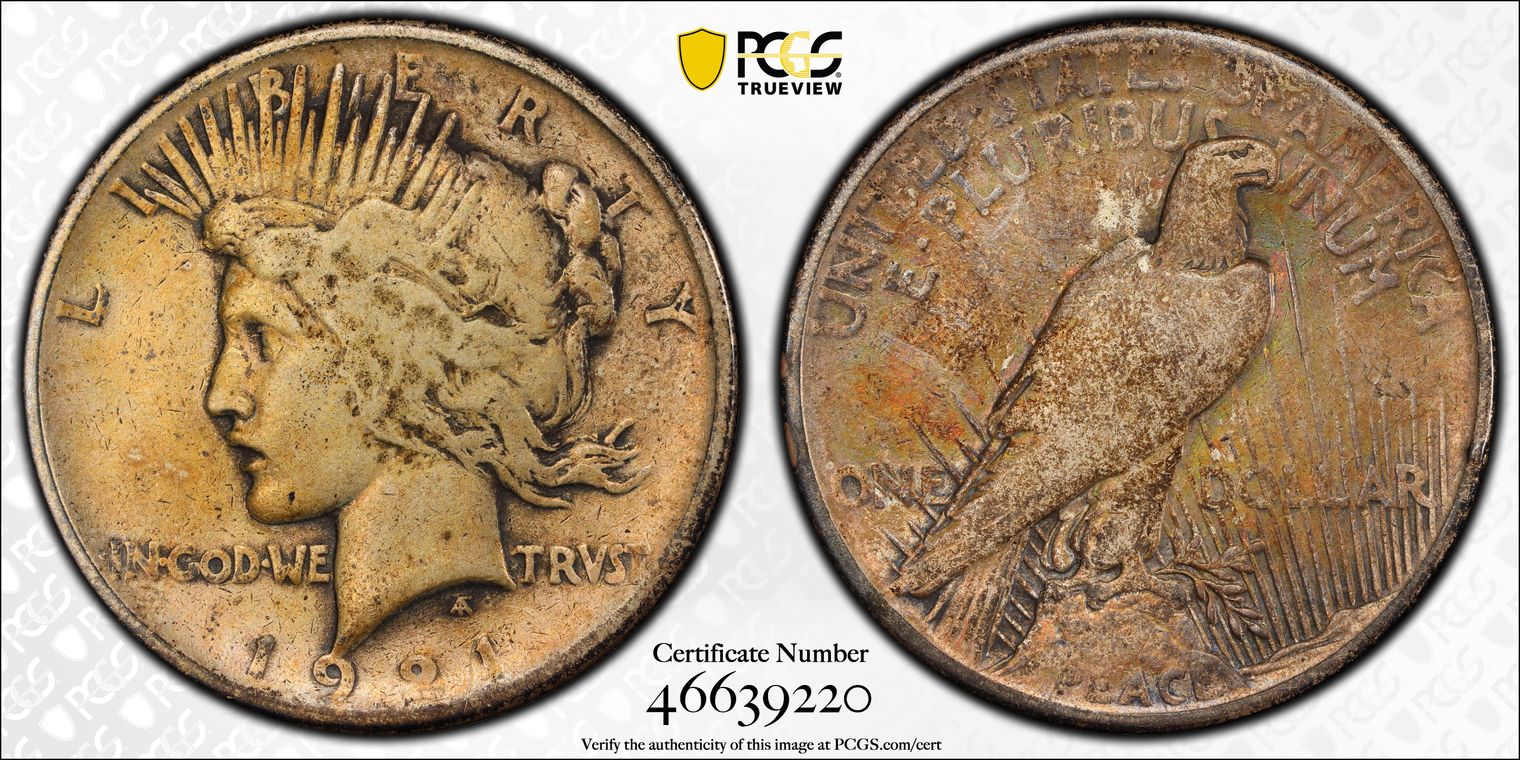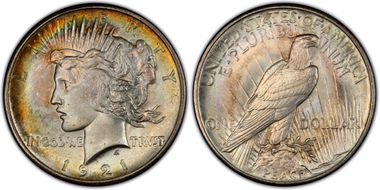1921 $1 High Relief, Peace VG10 认证号46639220, PCGS号7356
拥有者评论
专家评论
David Hall
The 1921 Peace dollar is a very interesting and extremely important coin. It is, of course, the first year of issue for the Peace dollar series. Slightly over a million pieces were struck, a modest mintage for a silver dollar. But the 1921 was struck in very high relief, not unlike the 1907 High Relief $20 St. Gaudens. For many years the 1921 was not recognized as a separate type coin, although it clearly is such. The PCGS founders, along with the experts on the PCGS (and now PCGS CoinFacts) Board of Experts, confronted this lack of type coin recognition sometime shortly after the 1986 launch of PCGS. We all just start listing the 1921 as a separate type and the numismatic community soon followed suit. So the 1921 is now important as both the first year of issue (and one of the scarcer isuues) for the Peace dollar series, and as a very important one-year-only 20th century silver type coin.
The 1921 is one of the scarcest Peace dollars in both circulated and mint state condition. In Gem condition it is scarce, but not quite as rare as some of the usually very weakly struck S Mints such as 1925-S and 1928-S which, because of strike, are very rare in Gem condition. Nevertheless, because of the high relief of the 1921, strike can definitely be a problem. The majority of mint state specimens show weakness in the central devices, i.e. Liberty's hair and the eagle's feathers. Well struck Gems are definitely the exception. Luster can vary on this issue. I have seen many that are white and quite frosty and I have also seen many that have a very satiny look. Toning is not uncommon and is light to heavy golden. Note that I am of the very strong opinion that any 1921 Peace dollar...indeed any Peace dollar...that has any rainbow colors (blue, red, green, etc) is absolutely artificially toned. While not very scientific, my approach to toning on coins is to remember the colors I saw in the 1960's and 1970's and if a new look appears, it's artificial to me. This is kind of an "old school" approach and I may be wrong, but unless you believe global warming has created new colors for coins, it just seems illogical to me that new colors would suddenly appear naturally on coins. Back to the 1921 Peace dollar...this is, in my opinion, one of the most important coins of the 20th century, and also one of the most beautiful.
Q. David Bowers
The following narrative, with minor editing, is from my "Silver Dollars & Trade Dollars of the United States: A Complete Encyclopedia" (Wolfeboro, NH: Bowers and Merena Galleries, Inc., 1993).Coinage Context
Production and distribution: From December 26 through the 31, 1921, the entire production of 1921 Peace dollars, 1,006,473 examples, was effected. The coins were released into circulation on January 3, 1922. Peace dollars were struck only at the Philadelphia Mint in 1921.
Numismatic Information
Most were distributed: It is probably the case that nearly all of the 1921 Peace dollars were distributed within a few years of the time of striking, due to the novelty of the design. I have never heard of even one original mint bag of 1,000 1921 Peace dollars coming on the market, and during extensive research I never came across a quantity offering of any kind. This makes the 1921 Peace dollar unique in this regard, for all other Peace dollar varieties 1921-1935 were available at one time or another in multiple-roll and bag quantities several years or more after they were minted.
When I asked Philadelphia dealer Harry J. Forman (who has handled as many dollar bags during his numismatic career as anyone), he knew of no original bags either. Indeed, I have never even seen an original Uncirculated roll of 20 coins! On the other hand, dealer Maurice Rosen reported that around 1979-1980 he bought a roll of Uncirculated pieces from Don Apte, and that: "if my recollection is accurate, they would make today's MS-64 and 65 grades. All were frosty white with above average surface characteristics for the issue." (Letter to the author, September 8, 1992.) However, a roll of 20 pieces is hardly a large quantity.
Curiously, although the 1921 Peace dollar has edged upward in price over the years, it has not been the subject of "pushing" by investment newsletters or advisors. Perhaps this is because few people had a vested interest to do so.
The 1921 Peace dollars, with their high relief design, actually represent a different and distinctive type, but popular holders for type sets have not reflected this, and all Peace dollars are included under one general design heading.
David Hall, founder of the Professional Coin Grading Service, commented as follows: (David Hall's Inside View, No. 125, 1991, p. 2.)
The 1921 High Relief Peace dollar is one of America's all-time classic coin issues. It's the first Peace dollar, it's a one year-only type coin, and it's a gorgeous coin. In MS-64 the 1921 High Relief is scarce. In MS-65 it is rare.
Striking: High Relief 1921 Peace dollars were difficult to strike properly with one blow of the coining press. Nearly all known specimens are lightly struck on the hair at the center of the obverse and often at the center of the reverse as well. In fact, fewer than 10 1921 Peace dollars out of 1,000 are very sharply struck…Often, a high-grade 1921 Peace dollar will show a subdued white frost in the areas of light striking on the obverse; this represents the surface of the original planchet.
Circulated grades: A number of authorities have considered the 1921 in worn grades to be among the top three or four rarest coins in the Peace series. For example, Anthony Swiatek, writing in the Highfill Encyclopedia, considered it in circulated condition to be the fourth rarest coin of the design. The Guide Book lists the issue in worn grades among the highest valuations in the Peace series, perhaps giving reinforcement to the standard rarity concept.
However, I feel that the 1921, while elusive, might be more plentiful in VF-20 to AU-58 grades than indicated in the preceding 'paragraph. The reason for this is that many were saved as novelties by the general public. Among groups of miscellaneous coins saved in drawers, attics, etc., and brought to coin dealers for sale, it is not unusual to find one or several 1921 Peace dollars, often very toned, that Were set aside years earlier. In this vein, Thomas K. DeLorey reported in 1992 that at the Illinois dealership of Harlan Berk, Inc., "we buy two or three a week over the counter." (Undated note to the author, received October 5, 1992.)
When found in the hands of ordinary (i.e., not numismatic) public, 1921 Peace dollars are usually singles or in twos or threes. I do not recall ever seeing a significant hoard of them. In the 1950s, coins of this date were common in bags of mixed dollars and, more than any other Peace issue, were usually darkly toned. Perhaps the high relief of the design prevented the fields from becoming as rubbed as on later issues, thus allowing more toning to form. As my estimate of the availability of the 1921 Peace dollar in worn grades is based upon a recollection more than 35 years old, I will defer to the Swiatek and Guide Book indications. Hence, my estimate of 50,000 to 90,000 surviving pieces places the 1921 among the scarcest issues in the series.
Mint State grades: Many thousands of Mint State 1921 Peace dollars exist, most of which are weakly struck, as noted. The typical coin has nice lustre and is very pleasing in appearance. Many coins stored in bank bags with other coins show yellow, yellow-gray, or even black toning. Perhaps more than any other single variety in the Peace dollar series, the 1921 will require a great' deal of searching to find a sharp coin. It is probably practical to settle for an average strike-sa coin that is somewhere between a typical weak strike and a hard-to-find sharp strike.
In 1982, Wayne Miller commented as follows:
"Fully struck 1921 Peace dollars are very rare and always command a premium. Well-struck gems are very desirable." This information is just as valid today.
Most Uncirculated 1921 Peace dollars are in the MS-60 to 62 range. These are plentiful. MS-63 coins, while scarcer, are also easy to find. At the MS-64 level the issue becomes elusive, and MS-65 coins are rare.
Something to look for: Some specimens exist with reverse die rotated 20° counterclockwise from the normal orientation. These are rare.
Varieties
Circulation strikes:
1. High Relief: Breen-5712. Hub combination I-A. VAM-1. Obverse and reverse in higher relief than in later years (except January 1922 High Relief issues). Fields (particularly the obverse) more concave than on later years. Obverse: Rays from top of Miss Liberty's head thicker, and without the three very short rays seen between the first four longer rays on later issues. Reverse: Leaves and branch slightly differently configured than on later issues. Distant mountains at lower right differently arranged. Arrangement and count of rays slightly different than later issues. A comparison of a 1921 dollar with any specimen of the low-relief style 1922 and later will show these and other minor differences.
VAM-2 has the letters in PEACE on the reverse slightly doubled on the left side. Slightly scarcer than the preceding.
Dies prepared: Obverse: 41; Reverse: Unknown. Circulation strike mintage: 1,006,473, all struck during the last few days of December 1921.
Estimated quantity melted: Probably none under the Silver Purchase Act of 1942 except as part of mixed date groups.
Characteristics of striking: 99% or more are lightly struck on the hair strands at the center of the obverse.
Known hoards of Mint State coins: None
Commentary
1921 Peace dollars were very widely distributed beginning in 1922. Coins of this date have high-relief features.
Ron Guth
According to the June 1934 issue of The Numismatist (p. 416), collectors could still purchase Uncirculated 1921 Peace Dollars for "the face value of the coins and an amount sufficient to cover the mail charrges by first-class mail."
稀有性和存量估计 了解更多
| 所有评级 | 100000 |
| 60或以上 | 40000 |
| 65或以上 | 5000 |
| 所有评级 | R-2.0 |
| 60或以上 | R-2.6 |
| 65或以上 | R-4.0 |
| 所有评级 | 1 / 1 |
| 60或以上 | 1 / 1 |
| 65或以上 | 1 / 1 |
| 所有评级 | 7 / 24 TIE |
| 60或以上 | 13 / 24 TIE |
| 65或以上 | 18 / 24 |






















